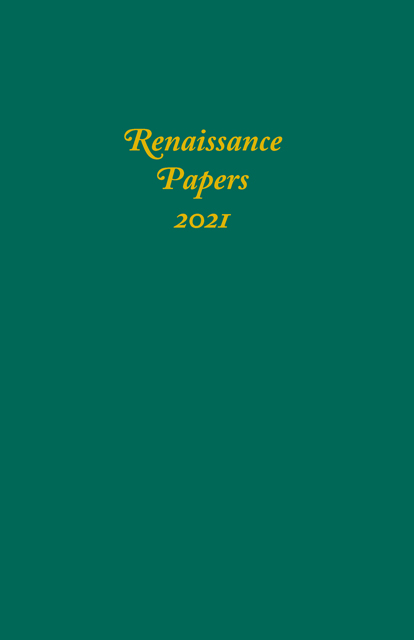Book contents
- Frontmatter
- Contents
- Dedication
- “Strange Serious Wantoning”: Early Modern Chess Manuals and the Ethics of Virtuous Subterfuge
- “Both Use and Art”: Motifs and Method in Astrophil and Stella
- Embodied Love(rs): Injury and Comedy in Mary Wroth’s Urania
- Edmund Spenser’s Automaton Alchemy: The Case of False Florimell
- Who Edited the 1571 Mirror for Magistrates?
- Statues Living and Conscious: Hermetic Statue-Magic in The Winter’s Tale
- Transmutation and Refinement: The Metaphysics of Conversion and Alchemy in Renaissance Spain
- The Twelve Inka and the Twelve Caesars: Reflections on an Early Modern Visual Theme in the Art of Colonial Peru
- Linguistics and Epistemology in Thomas Harriot’s North Atlantic World
- Assembling the King’s Body: Examining Holbein’s Portrait Techniques and the Fashioning of Henry VIII’s Image in the English Renaissance
- Molière’s L’École des Femmes between Shame and Guilt
Transmutation and Refinement: The Metaphysics of Conversion and Alchemy in Renaissance Spain
Published online by Cambridge University Press: 17 December 2022
- Frontmatter
- Contents
- Dedication
- “Strange Serious Wantoning”: Early Modern Chess Manuals and the Ethics of Virtuous Subterfuge
- “Both Use and Art”: Motifs and Method in Astrophil and Stella
- Embodied Love(rs): Injury and Comedy in Mary Wroth’s Urania
- Edmund Spenser’s Automaton Alchemy: The Case of False Florimell
- Who Edited the 1571 Mirror for Magistrates?
- Statues Living and Conscious: Hermetic Statue-Magic in The Winter’s Tale
- Transmutation and Refinement: The Metaphysics of Conversion and Alchemy in Renaissance Spain
- The Twelve Inka and the Twelve Caesars: Reflections on an Early Modern Visual Theme in the Art of Colonial Peru
- Linguistics and Epistemology in Thomas Harriot’s North Atlantic World
- Assembling the King’s Body: Examining Holbein’s Portrait Techniques and the Fashioning of Henry VIII’s Image in the English Renaissance
- Molière’s L’École des Femmes between Shame and Guilt
Summary
The rapid expansion of Spanish power in the fifteenth century throughout the Iberian Peninsula and across the Atlantic resulted in the first truly global empire. This conquest provoked the question of how the newly unified, and now international, Catholic monarchy would govern converted, non-European subjects. In particular, the lingering Converso and Morisco communities still living in Spain, and the indigenous populations in Mexico challenged the Spanish church. Up until the thirteenth century, Catholic governments in the kingdoms that would form Hapsburg Spain had allowed a limited religious tolerance. This toleration was based on the assumption that the souls of heretics and heathens were already too “hardened” in their error to be converted. Intellectual developments in early modern religious and scientific cultures challenged this notion.
Growing religious intolerance in Spain was expressed through the nationalization of medieval inquisitions and conversion projects into the formidable, global Spanish Inquisition. The Renaissance spurred a shift in how the nature of the human soul, and its potential for change was regarded. Intolerance and the push for conversion corresponded with a more nuanced understanding of the non-Catholic ethnic groups. This shift is mirrored in contemporary theories of mineral formation, and the process of alchemy. Positive change in both religion and alchemy was possible based on refinement and cultivation of the original “good” in the material, whether it was a vulgar metal or a human soul. Although this essay is too brief to properly connect these ideas, they are related and fed off each other in the Spanish Renaissance.
These metaphysical relationships are especially apparent in the overlap between the language and logic of written discourses on both the alchemical and the religious conversion processes. When Granada fell in 1492, the limited toleration of Islam and Judaism was firmly replaced with the goal of religious union. These ethnic and religious minorities had “debased” Spain, and while they could not be passively tolerated, they could be converted. Ferdinand and Isabella’s decree of expulsion highlighted the danger that Jews would cause in Spain. They argued that any social contact with them would cause weak Christians to apostatize. Although the decree does make a distinction between Jews who were “native” to Spain through their generational presence, the decree prioritized Christianity over familial history.
- Type
- Chapter
- Information
- Renaissance Papers 2021 , pp. 75 - 86Publisher: Boydell & BrewerPrint publication year: 2022



